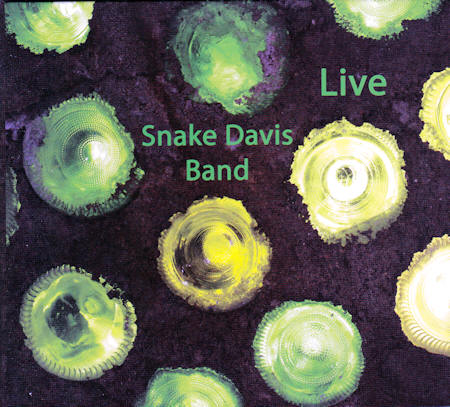
Painting © 2004 Loz
Arkle
Website
© Copyright 2000-2011 Alan White - All
Rights Reserved
Site optimised for Microsoft Internet Explorer



Early Blues Interview
|
|
I met up with Snake after his gig at the Skegness Rock & Blues Festival, January 2010.
Snake: My first strong musical memories are how much I loved to sing, not how good I was or how much I earned two and six from a church choir wedding, but just how much I enjoyed it and how music gave me that special feeling that nothing else did. Alan: Did you always want to become a musician? Snake: No. Up to my late teens it was a hobby. I loved it, I played with a guitar and I sang, played a bit of piano, learnt James Taylor and Joni Mitchell songs, played in folk clubs and then went off to university to do an arts degree. I didnít discover the saxophone until I was 19 but then within 3 months of having the golden beastie my life changed and I knew that was what I wanted to do. It was a life-changing, career-changing moment. Alan: What kind of material were you playing in the early days? Snake: I went to university in Liverpool in the punk era. I was in a punk band playing down at Erics, the Old Cavern, supporting bands like Deaf School and I had a band with Ian Broudie who is now in the Lightening Seeds, called the Old Boogie Brothers. Then the sax came and it came fast and I joined a funk and soul band called Frontline; so I was in Liverpool doing clubs, pubs, the punk band, then the funk band. I grew up dancing to Tamla Motown, Stax and Atlantic so it was soul and then I discovered Junior Walker Band and King Curtis and the rest is history. Alan: How do you view the blues as a music genre? Snake: Just about everybody who plays an instrument seriously of our generation grew up playing the blues. I started the flute before the sax and there was only one blues flute player, Herbie Mann, so I used to listen to him playing Memphis Underground. A 12 bar blues is the first thing you learn on a guitar too, listening to Sonny Terry and Brownie McGhee. Itís a universal language in a way Ė Iíve just been on tour in Japan and I didnít share the language but I still sat down and played a blues with them. It transcends and informs and is lurking behind everything you play. Even if you play the Irish Whistle, itís still there. Alan: Who has influenced you the most in your music? Snake: Probably King Curtis. He was a great Texan tenor player and Aretha Franklinís musical director. I had so many great albums of his, Melancholy Serenade. Alan: What is your favourite saxophone? Snake: Itís still the tenor, but only just. When I started, it was definitely the tenor because that was the sound Ė Junior Walker, King Curtis, Tom Scott, but as Iíve matured over the decades Iíve added the other saxes and grown to love them as well. Iíve also added the tin whistle, the Irish whistle and the Shakuhachi, a Japanese bamboo flute which I play a lot. But itís still the tenor and if I had to keep just one, itíd be the tenor sax because thatís the soul blues horn. Alan: Tell me about this Japanese flute Ė itís so unusual. Snake: Yes, it is unusual. Itís as old as the hills and is just a stick of bamboo with 5 holes in. At first it was a meditation tool rather than a musical instrument. The Zen monks played the Shakuhachi in their search for enlightenment and then it crossed over into Japanese folk and classical music and Iíve brought it in and used it in a sort of ambient, floaty way with the Japanese influence and some Snakey soul influence. Thatís my greatest challenge over the last 10 years.
Snake: Yes, there are many but the one that sticks out at the moment is because the CD that Iím going to give you ĎSnake Davis Band Ė Liveí was recorded on the day my father died, about a year ago. He died that morning and we had a sold-out show that evening that we were going to record and the show went on. It was about the time we were about to start playing Lennonís Imagine and I always remember playing it that day. We played it at the sound check so it was the first thing I played after my dad died and that will always bring back that memory for me. Alan: I know youíve been asked lots of times but for the record, how did you come to have the name Snake? Snake: I went to Leeds College of Music after Liverpool University and I was out doing a show one night in one of the bars and the girl who was with my best mate (who still plays bass with me) said, ďYou know, you look just like a snake. The way you sort of weave, the way your body moves, and they way you slither around a melody and never play it straight but always in a bendy fashion. Itíd be a great stage name.Ē And I thought about it and decided, ďYeah, Iíll have itĒ. Alan: Youíve played with an amazing range of artists and bands. You must have some fond memories of them Ė are there any youíd like to share? Snake: It has been amazing. I re-met somebody today who was on the Eurythmics tour and that was a big-deal world tour when Dave and Annie were back together after a 10 year break from each other on their Peace Tour. My long term relationship with Heather Smalls has been really special. Lisa Stansfield was the first big artist that I worked with and we still have a friendship and occasional musical meeting. Those are the ones who stick out and then there are the ones that you meet and get to work with for just a day or half a day like James Brown, Paul McCartney, Smokey Robinson, Ray Charles. Alan: I know youíve been on TV many times but which did you particularly enjoy? Snake: One of the early TV performances was a totally solo rendition of a bluesy, jazzy number called Willow Weep for Me which was on The Tube with Jools Holland and Paula Yates. I was wheeled in to celebrate the anniversary of the saxophone and that was very exciting, and thrilling and scary. I just stood on an orange box in the middle of a live audience and played to nationwide TV. But I got spotted on that and called down to London to do some big sessions, so it was a milestone too.
Snake: Right up to Christmas I did a long tour of Japan with an artist called Ekichi Yazawa and he was the first Japanese guy to put on a pair of leather trousers and sing rock and roll in Japanese. He was like a cross between Elvis, the Beatles, Cliff Richard and Mick Jagger Ė completely bizarre. That was an exciting tour and we were playing venues like Tokyo Dome which seats 50,000 and finished with five nights at the famous Budokan where the Beatles played. Iíve got two great Shakuhachi teachers in Japan so that was great too. More recently Iíve been out with this band doing 3 or 4 shows every weekend and itís been absolutely brilliant getting back down to the dirty stuff. Alan: Tell me a bit more about the band. Snake: Iíve always had bands. The Snake Davis Band is the one thatís probably got the longest history and the one I work with the most. Itís a four piece band - always a Hammond/electric key boards, bass player and drummer and itís the vehicle I use for playing the majority of the music I write. We just get out and play as many shows as we can to as many people as we can and itís always great. Alan: What about the Suspicions? Do you still play with them? Snake: Yes. They are an 8 piece northern soul band. Because itís big and weíre all spread out and some of them have day jobs, we never seek work for that band but work comes to us and it was really born out of our love of soul and northern soul. With that band weíve backed countless American northern soul legends that have come over to the UK like Chuck Jackson, Eddie Taylor, Barbara Lynn, Popcorn Wylie, Frank Wilson and millions of others. Itís been going for 20 odd years, we all love it and it just comes out of hiding every now and again.
Snake: I do enjoy it, probably more than anything else. I like playing live better than anything. The most exciting and meaningful thing I do in my musical life is to play to audiences. Itís all very well playing Tokyo Dome to 50,000 people doing some Japanese guyís music but Iíd rather be playing Skegness to 1,000 playing my own music or Durham Town Hall to 200. Alan: What about future plans? Snake: Iím working on a new album which is going to be smooth and tender and gentle we think. Weíre two tracks into that so thereís a lot of work coming up for that CD and we hope to get it out later in 2010. And then, more of the same with this band and an occasional outing with the Suspicions. Thereís also a lovely line up we have called The Burden of Paradise with a singer called Helen Watson, double bass and guitar, no drums. Thatís a very beautiful line-up and we have work lined up with that. Alan: Have you got a title for the new album yet? Snake: No. But what was that word you used earlier? Sublime! Perhaps thatís what we should call it.
Alan:
Tonightís
performance was indeed sublime. Thank you so much for your time.
Album available from Snake's website: Check out more photos of Snake at the Skegness Rock & Blues Festival, January 2010. Return to Blues Interviews List
Website, Photos © Copyright 2000-2010 Alan
White. All Rights Reserved. |





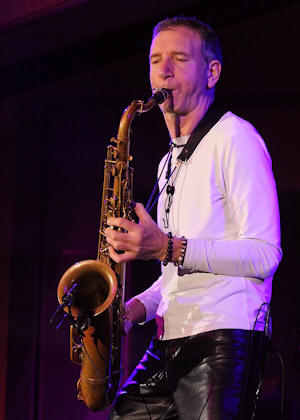 Alan:
What were your first musical memories growing up in South Wales?
Alan:
What were your first musical memories growing up in South Wales? 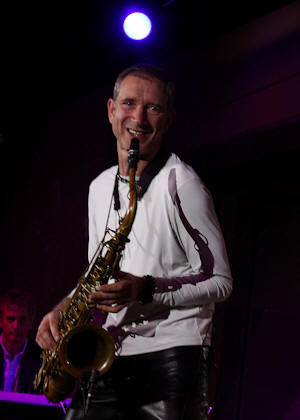 Alan:
Are there particular songs that have special meaning to you?
Alan:
Are there particular songs that have special meaning to you? 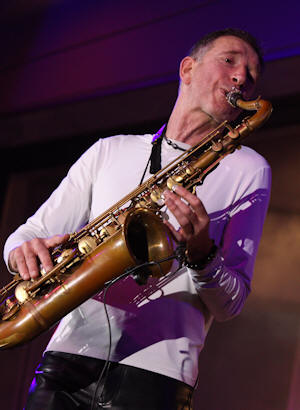 Alan:
What have you been up to lately?
Alan:
What have you been up to lately? 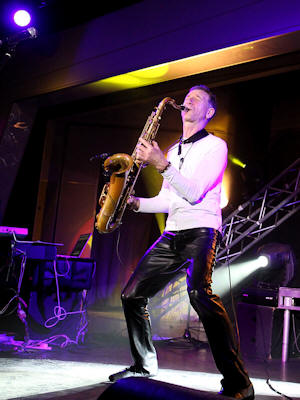 Alan:
Alan:
